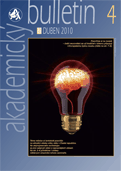Academy of Sciences of the Czech republic › Science and Research › Significant and interesting projects › Humanities and Social Sciences Division
RECORD - Recognising Central and Eastern European Centres of RTD: Perspectives for the European Research Area
The thematic RECORD network was supported by the 5th Framework Programme of the European Union and comprised 3 member states of the European Union - Austria, Ireland, Great Britain and 6 then associated countries - the Czech Republic, Hungary, Malta, Poland, Slovakia, Slovenia; its Czech co-solver was the Centre for the Study of Science, Technology, and Society of the Institute of Philosophy based at the Academy of Sciences of the Czech Republic.
The aim of the project was to verify possibilities of using benchmarking methodology in the countries of Central Europe then accessing the European Union for the evaluation of the research, development and innovation activities of organisations dealing with research, technology development and innovations (organisations of Research, Development and Innovation), and assist in practical teaching of benchmarking at all levels of management and decision-making.
The most important outputs are two scholarly publications (both of them co-authored by Adolf Filáček and Jiří Loudín). It is the "Manual of the RECORD Project: Benchmarking of" (Budapest 2004) - in Czech available at http://www.record-network.net/dynamic/public-manual/RECORD_Manual_Czech.pdf, and "The Experimental Map of the RECORD project: Innovation Research Organisations in the Accession Countries of the European Union" (Budapest/Brussels 2005). There are also 4 collections of conference presentations, releasing articles summarising the outcomes of benchmarking studies and realized surveys in the individual participant countries.
The outcomes of the RECORD project suggested that the support of factors affecting the operation of the Research, Development and Innovation organisations could be successful only if the general economic and political setting favours innovations. In such a setting, the protection of the rights of personal mental ownership is of crucial importance; however, in Central and Eastern European countries these rights cannot find support in a required tradition (in defiance of the relevant instructions of the European Union). Besides other things, the researchers very often do not realize the worth of their knowledge and they tend to prefer publicity to protection and use of their knowledge. Other aspect is relevant in this respect: professional entrepreneurial knowledge is not developed properly even in the research institutions and in society as such.
In sum, we can say that using benchmarking methodology in new member states leads - in case of institutions being evaluated - both to learning and perfecting conceptions referring to processes of knowledge production, knowledge utilisation and knowledge distribution, and also to higher effectiveness of diffusion and dissemination of the utilizable research and development outcomes and to more exquisite mastering of tools of their usability on the market.

Institute of Philosophy of the ASCR







